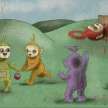Neurological Development in Children
From Birth, onwards.

Neurological development of children starts happening from conception. 75% of the development occurs between contraception and six years old. ‘Neurological’ refers to the nerves and the nervous system.
Some Facts to Get Started:
- Most of the brain cells are formed before birth
- Early experiences and interactions with the environment are most critical in a child’s brain development.
- A three-year-old toddler’s brain is twice as active as an adult’s.
- Taking to children establishes foundations for learning language during early critical periods when learning is easiest for a child
- What children need most is loving care and new experiences, not special attention or expensive toys. Talking, singing, playing and reading, are some of the key activities that build a child’s brain.
Neurological Development in Children:
This development includes the growth and reinforcement of neural pathways, which, are unconnected nerve cells before birth. The nervous cells connect with each new sensory experience: Ophthalmoception (Sight), Audioception (Sound), Gustaoception (Taste), Olfacoception (Smell) and Tactioception (Touch).
MOTOR SKILLS-
The brain begins to control the muscles. As the brain gains control, the child begins to move their limbs around – this is development of motor skills. A child will now begin to grasp toys, moreover, they’ll develop the movement in their toes and feet. It is vital that children are encouraged to increase their development whenever possible.
OPHTHALMOCEPTION AND AUDIOCEPTION -
These are the first senses to be developed by children. Children should be exposed to many mediums, such as colours and sounds. Many parents choose a mobile to out over their child’s cot. Furthermore, as the child grows up, a mood night light with music will help develop the child’s visual and auditory senses.
LANGUAGE SKILLS -
Babies will begin by gurgling and crying by way of communication. As they grow, they’ll adopt monosyllables to communicate, ‘ma-ma.’ Talking to the child will help their development with communication and will encourage them to speak. Parents and teachers could help by reading to the children and even though they may not understand, they will be able to understand the difference in sounds, etc. This will be stored in the brain for future reference.
EMOTIONAL AND SOCIAL QUOTIENT -
How a child is treated and feels in a given environment, effects the emotional and social development of the child. A healthy and safe environment is essential in the good development of the child, especially when considering that the child is venerable to any ill feeling or atmosphere. It is very easy for a child to feel happiness or love, but it likewise just as easy for them to feel anger. Providing the child with positive emotions will greatly advantage their emotional and social development.
4-9 Months: - The brain starts responding to words and sounds. The baby begins to develop memory as they experience different things .
10 Months - The child begins to focus on their own language, using momosyllables 'ma ma,' for example. They will also begin to pay attention to what is spoken around them.
12 Months - The child will now respond to exaggerated sentences (Often considered 'baby talk.' It is suggested that people should speak to children in a way they'll understand.
12-24 Months - Memories are now explored and they can begin to solve simple toy requirements, for example, winding a toy or pulling something. They will know their friends and recognise the epople around them and will not like strangers handling them.
30-36 Months - Children will now begin to understand and recognise their surroundsings. They will also be able to show two emotions at a time.
Factors That Can Effect Neurological Development
There are several factors which can effect neurological development.
A Woman Falling on Her Stomach or Back-
This may cause damage to the soft skull of the foetus. This could lead to mental impairment.
Environmental Factors -
The emotional and mental state of the mother during pregnancy effect the brain development on the baby. This could lead to cognitive and mental disabilities with the child. The foetus’ brain is vulnerable and deep trauma from the mother could result in deficiencies, or even death.
Abuse -
Any type of abuse, emotional or physical could cause harm to the foetus. A fluctuation of blood pressure, caused by fear from the abuse also affects the baby. The blood pressure affects the placenta – the baby’s main life source (nourishment, etc). The placenta also provides the foetus with oxygen… if the foetus is starved of oxygen, the baby could experience a severe lack of brain development and damage to the neurons.
Alcohol, Smoking and Drugs -
This links to disabilities, impairments and ADHD. Alcohol can stunt the growth, weight and overall development of the foetus. If a woman smokes, she will have a smaller baby, which will have mental and physical disabilities. If a mother uses drugs whilst pregnant, this could suppress the growth of nerve cells.
Genetics -
Genetics play a part in causing damage to the brain. The foetus can inherrit dysfunctions and imapred cells. Toxins in the envirment can also expose the foetus to neurological damage.
Aiding Neurological Development
These factors can help a positive brain development
• Reading – Reading to your child from a young age will enable to them to learn a wider vocabulary as they get older. Even if they don’t understand what you’re saying at first; they will recognise the different tones in your voice and be able to associate them with different ideas and emotions.
• Singing – Singing to your child will help them to learn and develop communication skills and will aid a child to think with words.
• Playing Games – Playing games stimulates your child’s brain, whether it’s peek-a-boo or a shape fitting game, it will help your child to start thinking about solutions to problems and will aid their speech and communication.
• Adequate Sleep – adequate sleep let’s your child relax. As their brain goes through a lot between the ages of 0-3, it is important the brain has time to rest and store the information it has learnt.
• Healthy Breakfast – A healthy breakfast ensures your child gets the energy they need to carry on the day. It will stimulate their senses and help them to use their brain effectively for play and learning.
• Exercise – Exercise increases the flow of blood to the brain, which in turn, delivers oxygen – which the brain needs for heightened alertness and mental focus. Because of this, exercise makes it easier for children to learn. According to some researchers in the U.S, exercise creates new brain cells in the Dentate Gyrus (a part of the brain), which is linked to a person’s memory.
About the Creator
Rebecca Smith
She/Her
Just be f*cking nice 🙌
Enjoyed the story? Support the Creator.
Subscribe for free to receive all their stories in your feed. You could also pledge your support or give them a one-off tip, letting them know you appreciate their work.






Comments
Rebecca Smith is not accepting comments at the moment
Want to show your support? Send them a one-off tip.